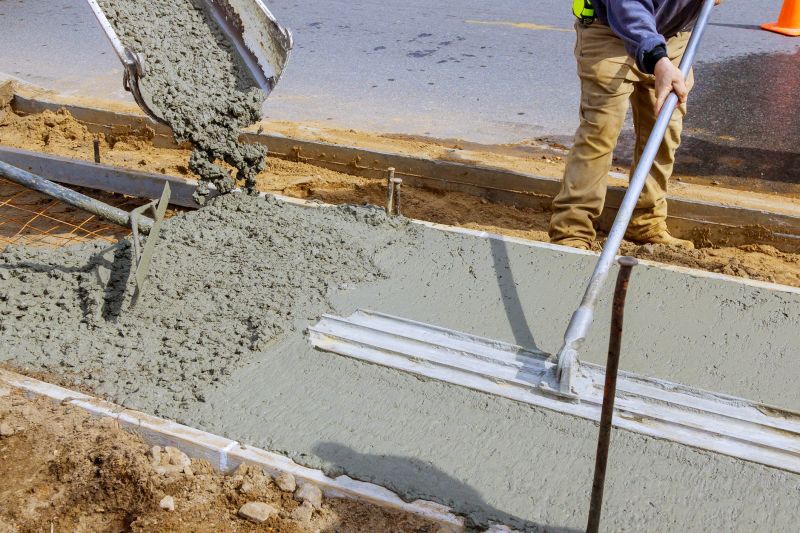Top-Rated Products For Efficient Concrete Installations
Choose from highly recommended supplies designed to boost productivity and quality in your concrete projects.
 Concrete installations are foundational elements in many construction and renovation projects. Whether you are pouring a new driveway, creating a decorative patio, or installing concrete barriers, choosing the right products is essential for achieving durable and professional results. From mixing and curing to finishing and sealing, there are numerous tools and materials designed to facilitate each stage of the concrete process.
Concrete installations are foundational elements in many construction and renovation projects. Whether you are pouring a new driveway, creating a decorative patio, or installing concrete barriers, choosing the right products is essential for achieving durable and professional results. From mixing and curing to finishing and sealing, there are numerous tools and materials designed to facilitate each stage of the concrete process.
Top Overall Option
Concrete Mixing and Pouring System
A comprehensive concrete mixing and pouring system combines durable mixers, adjustable chutes, and ergonomic handles to facilitate efficient and consistent concrete placement. This versatile setup is suitable for various project scales and can help improve workflow and safety during installation.
Types of Products For Concrete Installations
Concrete Mixers
Devices designed to blend cement, aggregate, and water into a uniform mixture, suitable for small to large projects.
Reinforcing Mesh and Rebar
Steel mesh or rebar used to strengthen concrete structures and prevent cracking over time.
Form Liners and Molds
Reusable or disposable molds that shape concrete into desired forms and textures.
Surface Finishing Tools
Tools such as trowels, floats, and edgers that help achieve smooth and decorative finishes on concrete surfaces.
Curing Compounds and Sealers
Products applied to concrete to retain moisture during curing and to protect surfaces after setting.
Concrete Vibrators
Tools that eliminate air bubbles and ensure proper compaction of concrete in forms.
Expansion Joints
Materials that accommodate movement in concrete slabs, preventing cracks and damage.
Surface Texturing Tools
Tools to add slip-resistant textures or decorative patterns to finished concrete.
Concrete Edgers and Groovers
Tools used to create clean edges and control joints in concrete slabs.
Drop Cloths and Protective Barriers
Materials to protect surrounding areas and surfaces during concrete work.
Concrete Dyes and Coloring Agents
Products used to add color and decorative effects to concrete surfaces.
Portable Concrete Mixers
Small, mobile mixers suitable for DIY projects and small-scale installations.
Concrete Repair Patches
Materials designed for fixing cracks and surface damage in existing concrete.
Vapor Barriers and Moisture Retarders
Products used beneath concrete slabs to prevent moisture intrusion.
Anchors and Fasteners
Hardware for securing fixtures and structural elements to concrete surfaces.
Popular Choices
Widely used for small to medium projects, offering mobility and ease of use.
Commonly selected to enhance structural integrity in slabs and foundations.
Popular for protecting finished surfaces and enhancing durability.
Essential finishing tools favored for achieving smooth surfaces.
Frequently used to allow for movement and prevent cracking in large slabs.
Popular for ensuring proper compaction and reducing air pockets.
Chosen for decorative finishes and custom textures.
Often used to add slip-resistant textures or decorative patterns.
Commonly applied to maintain moisture during curing process.
Popular protective materials for surrounding areas during installation.
Selected for decorative coloring of concrete surfaces.
Frequently used hardware for attaching fixtures securely to concrete.
Proper preparation and selection of quality products can help ensure that your concrete installation maintains its integrity over time. This includes selecting appropriate mixing equipment, reinforcement materials, and surface finishing tools. Additionally, safety gear and protective products are important to consider to prevent accidents and ensure a smooth workflow.
In New Albany, IN, many contractors and DIY enthusiasts rely on a variety of specialized products to support successful concrete projects. Understanding the different product types and their specific uses can help you make informed choices tailored to your project needs. Whether you're a professional or a homeowner, investing in reliable products can contribute to the longevity and appearance of your concrete work.
This guide aims to highlight the most effective and versatile products for concrete installations, emphasizing a broad range of options suitable for various project sizes and complexities. By focusing on quality and functionality, you can select products that meet your specific requirements and help you achieve results that stand the test of time.
Key Buying Considerations
- Project scope and size to determine the appropriate quantity and type of products needed.
- Compatibility of reinforcement materials with the concrete mix and structural requirements.
- Ease of use and portability of tools, especially for DIY projects or small-scale installations.
- Durability and resistance properties of sealers and curing compounds suited for your environment.
- Type of surface finish desired, influencing the choice of finishing tools and form liners.
- Timing and environmental conditions affecting curing and setting times.
- Safety features and protective gear included or recommended for handling concrete products.
- Compatibility of accessories like expansion joints and anchors with your specific project design.
- Budget constraints balanced with quality to ensure long-term performance.
- Availability of replacement parts or accessories for ongoing maintenance or future projects.
- Ease of cleaning and maintenance of tools and equipment after use.
- Local building codes and regulations that may influence product selection.
- Supplier reputation and product reviews for quality assurance.
- Environmental conditions such as temperature and humidity that can impact curing and setting.
- Storage requirements for materials and tools to maintain their effectiveness over time.
